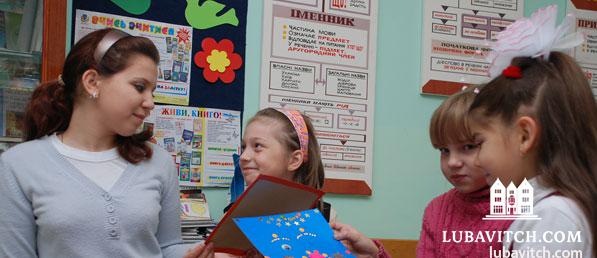(lubavitch.com) On September 1, 2009, 14,000 students in the Ohr Avner school system of the Former Soviet Union lined up for first bell.
Despite speculation that the recession would force many of the network’s 139 educational institutions to close, Rabbi Berel Lazar, Chief Rabbi of Russia says that “enrollment is up and more educational programs have opened.”
In Tbilisi, Georgia, for example, registration numbers rose by 30 students. In Sochi, Russia, and in Czernovtzi, Ukraine, Ohr Avner started a first grade; afternoon schools have opened in Khabarvosk and Krasnodar, Russia, and in Pervimayesk, Ukraine.
Rabbi Lazar admits that while many major donors were forced to cut down on their contributions, Lev Leviev, Chairman of Africa-Israel continues to provide funding for the Ohr Avner schools he established in the FSU. And new, significant donors like Mikhail Mirilashvili have stepped up and are making a critical difference.
“The economic crisis has made everything more challenging,” says Lazar, “and ultimately, the Shluchim are working a lot harder.”
ZHITOMIR, UKRAINE
FSU Chabad representatives interviewed for this report say that that the crisis has also uncovered grassroots support by local community people. “People who never gave before are taking responsibility and pitching in, and it’s making a small but meaningful difference,” says Rabbi Shlomo Wilhelm, of Zhitomir.
Wilhelm oversees an all-encompassing educational program in the city, with 175 students enrolled in its day school, which runs from preK through 11th grade; a college level program, and Alumim, a state-licensed home where 62 children, ages two to sixteen, live and receive comprehensive, loving care.
Until recently, day school tuition was entirely subsidized by Ohr Avner. Last year, for the first time, parents were asked to start paying tuition fees.
“They readily agreed,” says Wilhelm. “It was a test that proved that people were not willing to give up on the education and other programs they enjoy even if it meant digging into their own pockets in difficult times.”
TBILISI, GEORGIA
In October 2008, when it looked as though he might be forced to close the school, Rabbi Meir Kozlovski, Chabad representative to Tbilisi, posted a notice on the walls of the community center calling on parents “who cherish the school and don’t want to see it close, to come to a meeting.”
“I didn’t expect people would come—in the past, it didn’t seem to me that they really listened when I told them that we needed their help.”
In fact, 160 people showed up. When the rabbi told them that funds had dried up and that the school may have to close, people took the initiative. “They didn’t want to risk losing the benefits we’ve brought to the community here,” says Kozlovski. “They immediately assumed responsibility for collecting tuition, and though it covers a very small part, it proved their commitment .
While no students were turned away, a number of parents did withdraw their children when tuition fees were implemented. “We had 72 students at the time, and our numbers began to drop,” Kozlovski recalls.
But within two months enrollment numbers started climbing back up. This year, there are 96 students.
A different demographic became interested when the school began charging tuition, observes Kozlovski. “Better established families moved their children from public schools and other non-Jewish private schools,” placing them with Ohr Avner instead.
Kozlovski’s experience changed his perspective on the “everything’s free” model that had become entrenched in a post-communist milieu. “People under-appreciate anything that can be had for free,” he says.
Still struggling to meet his budget demands, Kozlovski nevertheless recently recruited another Chabad couple from Israel to help develop adult educational programs. With local people now sharing responsibility, the dynamic has changed and “it’s a much better one.”
NIZHNY NOVGOROD, RUSSIA
The average worker in Nizhny Novogorod, one of Russia’s large industrial cities, takes home about $500 a month in wages. And yet, 98 percent of Ohr Avner school parents agreed to pay $100 a month in tuition fees after the school nearly hit bottom last year.
“Parents stepped up and agreed that it was time for them to start contributing and paying tuition,” says Rabbi Shimon Bergman, the city’s rabbi and Chabad representative to Nizhny. “It proved how much they value the school.”
Forced to cut his annual $1.5 million budget down by nearly half without eliminating vital programs and services, Bergman, like many of his colleagues, is working harder and more creatively. And like Kozlovski, he’s finding that great things can still be achieved, even in this economy.
A newly launched adult educational seminar series, featuring presenters from Moscow and Israel, has attracted sixty paying participants. At the start of the new school year, Bergman dedicated a new kindergarten building. “The project was started before the crisis, and we had no choice but to complete it for our preschool children,” he says.
“It took miracles to make that happen.”
Bergman finishes every month, every project, with the help of miracles, he says. Take the unexplained decision by the municipality to begin disbursing monthly stipends to private schools, which helps the school with $7,000 a month; or the change in government school funding from a per class to a per child basis that increased the school’s allotment.
Though still in the red Shluchim say they see a silver lining in a crisis that has tested the resolve of everyone involved.
“There’ve been many positive changes that emerged in this crisis,” says Bergman. “I doubt this would have occurred when the going was good.”
Baila Olidort is Editor-in-Chief of Lubavitch News Service

Be the first to write a comment.